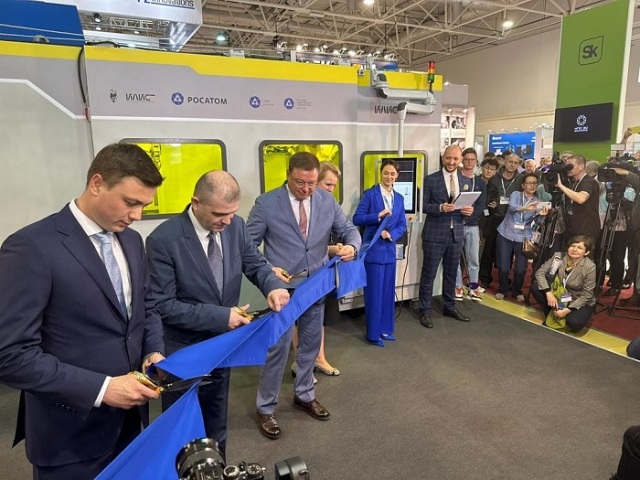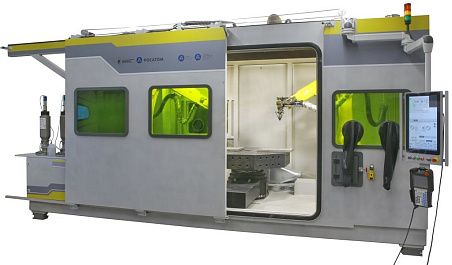On May 22, at the Metalloobrabotka-2023 exhibition in Moscow, Rusatom – Additive Technologies (RuSat LLC, part of Rosatom's TVEL Fuel Company) held a presentation of Russia's largest 3D printer using direct laser growing technology (PLV/DMD).The machine was created jointly with specialists of the Institute of Laser and Welding Technologies of the St. Petersburg Maritime Technical University.
The printer is equipped with two industrial six-axis robots and a positioner with a load capacity of up to 8 tons. The installation is designed for the manufacture of products with a maximum diameter of 2.2 meters and a height of 1 meter and the absence of defects in the form of large pores, cracks and foreign inclusions. This equipment makes it possible to manufacture large-sized products with specified strength characteristics at high productivity up to 2.4 kg/hour in the case of powder materials made of nickel alloys, stainless and heat-resistant steels. Another advantage is the possibility of manufacturing bimetallic and composite products from several brands of metal powders with different properties.
 |
| Russian DMD printer. |
| Source: Rusatom – Additive Technologies |
The innovative 3D printer can be used in all key high-tech industries - nuclear, aviation, shipbuilding, space. The use of the PLV installation at metalworking plants in the nuclear industry will reduce the cost of large-sized products, reduce their production time, and also begin the development of new promising designs.
For the first time on this equipment, a fragment of the enclosure of an internal device of an energy nuclear reactor of an optimized design with a height of 1 meter was made using two continuously operating technological tools of the PLV installation.
"Additive technologies are one of the drivers determining the appearance of a new generation of production, and the creation of a new installation of this class is an important step for the development of Russian industry. This is a breakthrough technology that opens up the possibility for a wide application of additive technologies in the nuclear industry, in particular, it will allow printing large-sized parts of nuclear reactors," said Olga Ospennikova, Executive Director of the Association for the Development of Additive Technologies.
"The creation of new powerful installations makes it possible to fully implement additive technologies in heavy engineering, to measure the weight of products printed on 3D printers not in kilograms, but in tons. This will save a large amount of materials, increase production productivity and product quality. Rosatom has a large-scale program for the introduction of additive technologies, and the creation of a new PLV installation is the starting point for the widespread use of 3D printing in Russian engineering," said Ilya Kavelashvili, CEO of RuSat LLC.
"Direct laser cultivation is a Russian DMD–class technology, which is characterized by higher productivity and significantly larger dimensions of products. Our joint development is the first such installation where several cultivation tools can work simultaneously without interfering with each other with their temperature fields. Our joint experience with Rosatom has proved that additive technologies can be successfully applied in heavy engineering," commented Gleb Turichin, Rector of SPbGMTU, Director and Chief Designer of the Institute of Laser and Welding Technologies.
For reference:The PLV technology is based on the layer-by-layer formation of the workpiece of the part by gradually increasing the volume of metal during melting by laser radiation of powder material supplied by an inert gas.
Direct supply of laser radiation and powder for the manufacture of products is carried out according to the 3D model being developed.
Currently, Rosatom has three additive technology centers in Moscow, Novouralsk and Nizhny Novgorod. By developing 3D printing technologies and a regional network of additive manufacturing centers, Rosatom contributes to solving state tasks in strengthening technological sovereignty. The goal of the State Corporation is to become one of the three leading companies in Russia in the field of additive technologies by 2030. The introduction of additive manufacturing creates new opportunities to improve the efficiency of Russian industry – such solutions will allow to reduce the time and cost of production by a factor of one, overcome barriers in the field of import substitution.
RuSat LLC (the enterprise of the Fuel Company Rosatom TVEL) is a specialized integrator company of the nuclear industry in the field of additive technologies (three-dimensional printing). The company's activities are focused on four key areas: the production of a line of 3D printers and their components, the creation of materials and metal powders for 3D printing, the development of integrated software for additive systems, as well as the provision of 3D printing services and the introduction of additive technologies into production (including the organization of production centers). https://rusatom-additive.ruThe fuel company of Rosatom TVEL (the Fuel Division of the Rosatom State Corporation) includes enterprises for the fabrication of nuclear fuel, conversion and enrichment of uranium, production of gas centrifuges, as well as research and development organizations.
Being the only supplier of nuclear fuel for Russian nuclear power plants, TVEL provides fuel to a total of 75 power reactors in 15 countries, research reactors in nine countries of the world, as well as transport reactors of the Russian nuclear fleet. Every sixth power reactor in the world is powered by fuel rods. Rosatom's fuel division is the world's largest producer of enriched uranium, as well as the leader of the global stable isotope market. The Fuel Division is actively developing new businesses in the field of chemistry, metallurgy, energy storage technologies, 3D printing, digital products, as well as decommissioning of nuclear facilities. Rosatom's industry integrators for additive technologies and storage systems have been created in the Fuel Company TVEL circuit. https://www.tvel.ruThe Russian industry has a goal to ensure technological sovereignty and transition to the latest technologies as soon as possible.
The state and large domestic companies direct resources to the accelerated development of the domestic research, infrastructure, scientific and technological base. The introduction of innovations and new high-tech equipment allows Rosatom and its enterprises to occupy new niches in the market, increasing the competitiveness of the nuclear industry and the entire Russian industry as a whole.
Department of Communications of JSC "TVEL"

